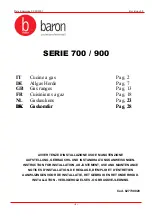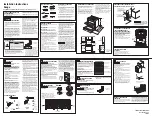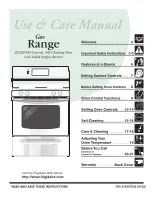
17
Basic Oven Operation
Important Things to Know Before
Operation
• Dacor recommends turning the ovens on for one hour
at 500°F (260°C) to burn off any residual oils used
during the manufacturing process. Any of these oils
left on the inner parts can cause an undesirable smell
the first few times the ovens are used.
• When you use an oven in one of the convection,
bake or roast modes, it preheats automatically. The
preheat cycle rapidly brings the oven chamber up to
the proper cooking temperature. Wait for the oven
to finish preheating (
Insert Food
appears on the
display) before placing the food in the oven.
Excessive
browning will occur if you put the food in the oven
while it is preheating.
• While an oven is preheating the actual oven tempera-
ture will appear on the display, next to the tempera-
ture setting.
It takes several minutes to preheat the
oven. Preheat time depends on the temperature set-
tings. The time may be longer depending on the type
of electrical supply in your community. There is no
preheat cycle for any of the broil modes.
• After you pull food out of the oven, it will continue to
cook. This process is called “carry-over.” The larger
the portion of food, the longer it will cook. It is best
to let meat rest for 10 to 15 minutes after it comes
out of the oven before carving. Doing so will allow the
meat to retain its juices and make it easier to carve.
• After you turn off an oven, the cooling fans may con-
tinue to run until the internal parts have cooled down.
• Broil modes do not work with the meat probe con-
nected.
•
This unit has been tested and found to comply with
the limits for a class B digital device, pursuant to
Part 15 of the FCC rules. These limits are designed to
provide reasonable protection against harmful inter-
ference in a residential installation. This unit gener
-
ates, uses and can radiate radio frequency energy
and, if not installed and used in accordance with the
instructions, may cause harmful interference to radio
communications. However there is no guarantee that
interference will not occur in a particular installation.
If this unit does cause harmful interference to radio
or television reception, which can be determined by
turning the unit off and on, the user is encouraged to
try to correct the interference by one or more of the
following measures:
◊
Reorient or relocate the receiving antenna.
◊
Increase the distance between the unit and
receiver.
◊
Connect the unit into an outlet or a circuit differ-
ent from that to which the receiver is connected.
Preset Temperature Settings
The oven has a suggested preset temperature setting for
each of the cooking modes to reduce the need to always
enter the temperature each time you cook. See the table
below. You have the choice (in most cooking modes) of
cooking at the preset cooking temperature or selecting a
different one. See
Starting the Oven
.
Cooking Mode
Preset Temperature
Bake
350°F (176°C)
Broil
550°F (287°C)
Convection Bake
325°F (162°C)
Convection Broil
550°F (287°C)
Convection Roast
350°F (176°C)
Defrost
130°F (54°C)
Dehydrate
125°F (51°C)
Max Broil
550°F (287°C)*
Pure Convection
325°F (162°C)
Pure Convection Sear
350°F (176°C)**
Proof
110°F (43°C)
Roast
375°F (190°C)
Surround Bake
350°F (176°C)
Warm/Hold
150°F (65°C)
* The preset temperature for Max Broil is not adjustable.
** The temperature for Pure Convection Sear is 75°F
(42°C) higher than the set temperature for the first 15
minutes of cooking.
















































